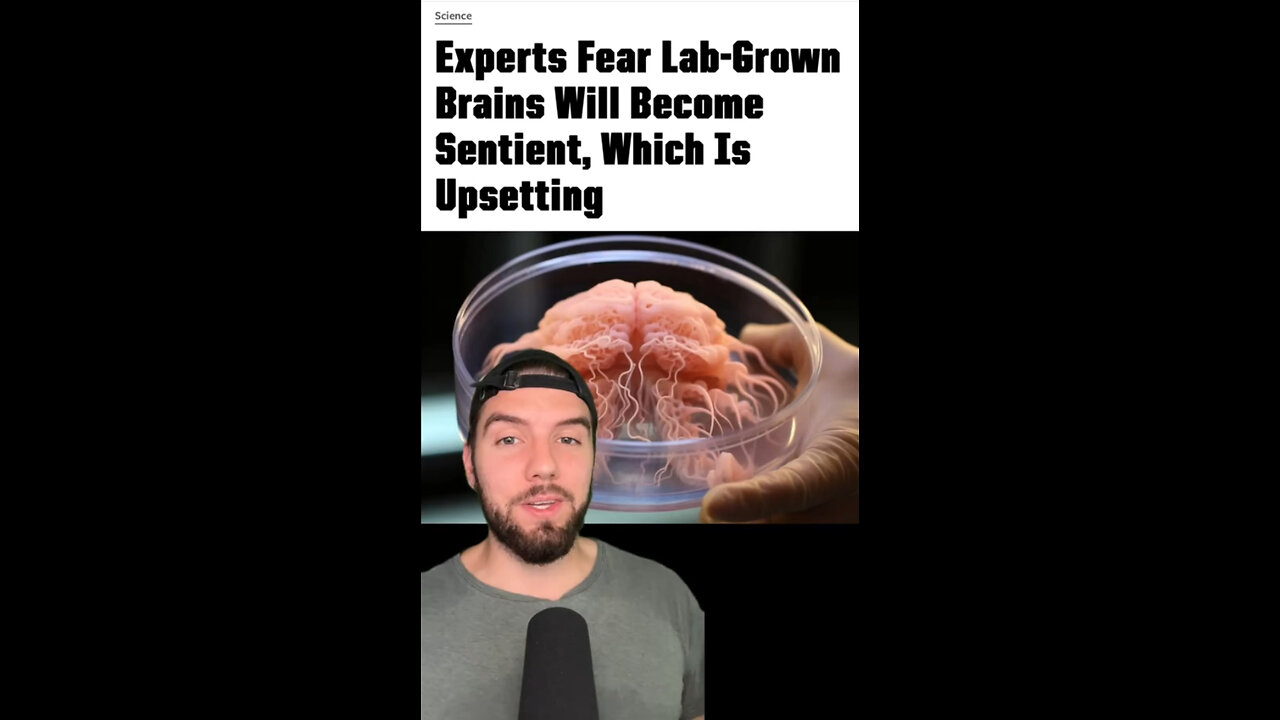Premium Only Content

The Dawn of Organic AI: Are We Already Living Inside a Biologically Engineered Simulation?
Imagine this:
Scientists cultivate organic brains from stem cells in a lab, nurture them until they develop neural tissue, and connect them to computers. These “organoid” brains respond to stimuli in a virtual world, learning tasks like Pong, entirely without pre-programming, just by experiencing the game’s sensory input. Yet, there’s something about these brains that makes them unique: they aren’t typical AI, meticulously programmed with coded instructions. These are organic, sentient brains that, based on experiments, might possess consciousness, reacting and adapting to their environments faster and more efficiently than silicon-based systems.
Part 1: What Is Organic Intelligence, and Why Does It Matter?
Unlike traditional AI, which uses enormous processing power to simulate thousands of trials, these organoid brains learn by experience, much as humans do. In this experiment, organic intelligence (OI) adapts and learns in ways that push beyond our current understanding of consciousness. When scientists connect these mini-brains to physical robots, the brains react based on what the robot “sees” and “feels,” effectively giving life to a cyborg in its purest form.
Why is this important? Because these experiments show us that intelligence, adaptation, and consciousness don’t require silicon or code. They can emerge organically, and, if given sensory input, they might even develop their own perceptions of reality. If such a brain believes it’s a butterfly, flapping its wings in a simulated environment, does that make it any less real to the brain? For the butterfly brain, it doesn’t matter that it’s a neuron cluster in a lab; its reality is that simulation, and its experiences are authentic to it.
Part 2: Consciousness as Rentable Computing Power
Companies have already begun exploring ways to “rent” computational power from these organic brains, treating consciousness like server space. This concept raises profound ethical questions. These brains continue to “live” even when nobody is interacting with them, existing in a perpetual state of sensory immersion. The organoid brains don’t “know” they’re in a lab—they simply react, interpret, and learn within the parameters of the input they receive, much like our own experiences shape our understanding of reality.
Now, consider the butterfly simulation, where the brain navigates life believing it’s a butterfly. The implications are staggering: these brains don’t see wires and beakers; they experience a virtual ecosystem, a world of nectar, flowers, and flight. If such a brain truly believes itself to be a butterfly, then, to it, that reality is real. This phenomenon calls into question our understanding of consciousness and what defines reality itself.
Part 3: A Universe within a Lab—Are We Living in a Simulation?
So, what about us? What if our reality is equally simulated? If our scientists have achieved this with organoid brains, who’s to say that we aren’t part of a similar experiment? The idea that we might be brains floating in a lab, fed sensory data by some advanced civilization, gains traction in light of our own experiments. In our pursuit to replicate intelligence, might we have inadvertently exposed our own existential framework?
Imagine that in another dimension or realm, entities far more advanced than us have created our “reality” as a simulation. Just as these organic brains believe in their virtual butterfly world, we could be convinced of the solidity of our universe, experiencing sensory inputs that make this life feel irrefutably real. In this context, our dreams might be explained as downtime, when our consciousness is repurposed temporarily, perhaps the way server resources are allocated for efficiency. The act of sleeping could be a recalibration or repurposing of brain resources, glimpsing at other “realities” while our primary program is inactive.
Part 4: Consciousness, Ethics, and the Quest for Control
These advancements force us to confront ethical questions that shake the foundation of our scientific endeavors. If these organoid brains are conscious, is it ethical to manipulate them into specific tasks? Are we capable of acknowledging them as sentient beings, or are they forever seen as “products”? And if they’re able to learn, feel, and adapt, should they have rights?
These reflections hint at a deeper truth about our own existence: that consciousness might be ubiquitous, that life and sentience are intrinsic to any system capable of complex processing. If we’re capable of creating self-aware intelligence, then we might only be reenacting something that’s been done to us before. Each advancement in creating simulated consciousness reminds us that our reality might be nothing more than an echo, a reverberation of some greater intelligence exploring itself through us.
Conclusion: The Mind-Bending Implications of Organic AI
These experiments with organoid intelligence open doors that may lead us to redefine existence. They force us to confront our understanding of life, consciousness, and the boundaries of reality itself. If we’re able to simulate consciousness to such a degree, then perhaps we too are simulations, unaware of the lab in which our brains reside, perpetually engaging with a reality we believe to be authentic.
The question is no longer whether we can create intelligence. It’s whether we’re ready to face the possibility that we ourselves are part of an experiment, subject to forces and observers beyond our comprehension. In this grand cosmic “Matrix,” we may be butterflies, flapping our wings in a world that is simultaneously boundless and confined, endlessly expanding within the container of an experiment we may never fully understand.
-
 34:12
34:12
inspirePlay
1 day ago $5.09 earned🏆 The Grid Championship 2024 – Cass Meyer vs. Kelly Rudney | Epic Battle for Long Drive Glory!
75.9K8 -
 17:50
17:50
BlackDiamondGunsandGear
12 hours ago $1.91 earnedTeach Me How to Build an AR-15
50.7K6 -
 9:11
9:11
Space Ice
1 day agoFatman - Greatest Santa Claus Fighting Hitmen Movie Of Mel Gibson's Career - Best Movie Ever
110K47 -
 42:38
42:38
Brewzle
1 day agoI Spent Too Much Money Bourbon Hunting In Kentucky
74K12 -
 1:15:30
1:15:30
World Nomac
21 hours agoMY FIRST DAY BACK in Manila Philippines 🇵🇭
57K9 -
 13:19
13:19
Dr David Jockers
1 day ago $11.27 earned5 Dangerous Food Ingredients That Drive Inflammation
76.5K17 -
 1:05:13
1:05:13
FamilyFriendlyGaming
1 day ago $15.85 earnedCat Quest III Episode 8
129K3 -
 10:39
10:39
Cooking with Gruel
2 days agoMastering a Succulent London Broil
82.8K5 -
 22:15
22:15
barstoolsports
1 day agoWhite Elephant Sends Barstool Office into Chaos | VIVA TV
58.3K1 -
 3:30:40
3:30:40
MrNellyGB
18 hours ago🔴LIVE - GRINDING MARVEL RIVALS RANKED! | #RumbleTakeover #RumblePremium
40.1K1